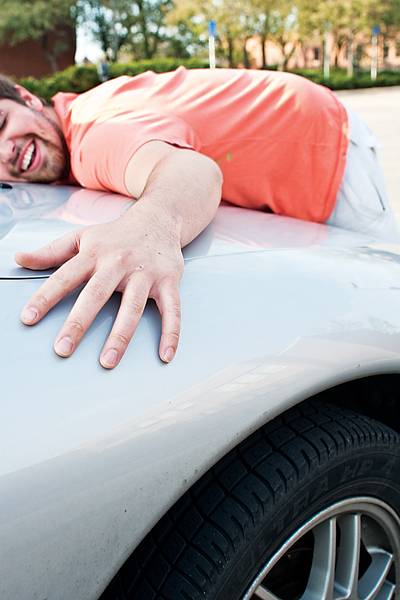MASTRE: Stick to what affects you

Owning a car is a commitment that costs, on average, $8,121 per 15,000 miles—without considering factors like the cost to the environment. Start in your driveway by focusing on the issues that affect you, and make a difference. Photo illustration: Rashah McChesney/Iowa State Daily
April 30, 2009
It’s been interesting listening to people’s mixed emotions about the recent Iowa State Supreme Court’s ruling on same sex marriage, finding that the ban is in violation of the rights of same sex couples.
Same-sex marriage has been legal in Canada since 2005, and as a Canadian, I didn’t think was a big deal anymore.
Apparently I was wrong. And there doesn’t seem to be a middle ground — people are either for it, or they dead-set against it. Given the multitude of problems in the world — the latest example the current spread of the swine flu, or the constant furor over our troops Iraq and Afghanistan — I would have thought the new ruling would have passed by quietly.
Even now, over three weeks later, people are still talking about it. So what, I say? Homosexuals are people no different from the rest of the world. We are all looking for somebody to share our lives with,
In the end, most of us want and seek acceptance. This is the 21st century, after all. We have welcomed genetically modified foods, clones, robots, climate change and a sea of other controversies into society.
A legal framework placing homo- and heterosexuals on equal footing can only be a great thing — a further sign of our progress toward becoming a non-exclusive society. Realistically, it seems like it should be the least our worries.
But the question remains, what about that third relationship we see everyday? Let’s focus on this instead.
You know the one I am talking about. The one that most of us enter into willingly and unknowingly, not understanding the full impact it will have on our lives… until it is too late. The same one that stays with us even after our partners come and go.
This is the special bond we share with our vehicles. Life changes the day we buy our first car. As a future landscape architect, it has been drilled into my brain how we have consistently designed communities for cars and not people.
We are now living in a society in which, essentially, you need a car to be successful.
We are so dependent upon these things to get us around from place to place that sometimes walking a few blocks becomes an insurmountable task.
According to the US Bureau of Transportation Statistics, in 1960 there were 61,671,390 passenger cars on the road.
By 2006 that number had jumped to 135,399,945 — that’s an increase of 45 percent, and only factors in cars.
Obviously this love affair is flourishing. Cities are growing. Traveling from one end to the other for an appointment could be impossible if relying on the public transit system.
The Energy Information Administration in tracking weekly gasoline prices says that for the Midwest, the average gas price has come down $1.578 since last year.
But even then, we are still spending thousands a year on fuel.
Right now gasoline is sitting at about $1.990 per gallon. For moderation’s sake, let’s say we spend $20 per week on fuel.
There are 52 weeks in a year. At $20 a week that’s about $1,300. Of course, frequent travel only exacerbates that number.
Factor in externalities like maintenance and tires, and the costs are greater. For example, the BTS found that in 2006, the “average cost of owning and operating an automobile” was $8,121 per 15,000 miles.
Owning a car is a serious commitment — kind of like signing on the dotted line of a marriage certificate.
When you factor in other externalities such as the cost to society in terms of air pollution and fossil fuel emissions, we are all affected. I’ll have you know that the EPA found CO2 emissions to have increased by 21 percent in the period from 1990 to 2007.
This is something we all have had to live with, yet nobody is complaining about that on the bus or by the local water cooler at the office.
A homosexual relationship does not affect us unless we allow it — if it really bothers you, then don’t think about it.
Instead, focus these energies on something that could make a real difference and get real results. Your car is just sitting there in your driveway — why not start there?
While you’re at it, why not analyze the chain around your leg attached to that car and realize this — homosexuality is not attacking your world, but there are other things that are — and they are sitting right outside your door.
— Erin Mastre is a graduate student in landscape architecture from Edmonton Alberta, Canada.






